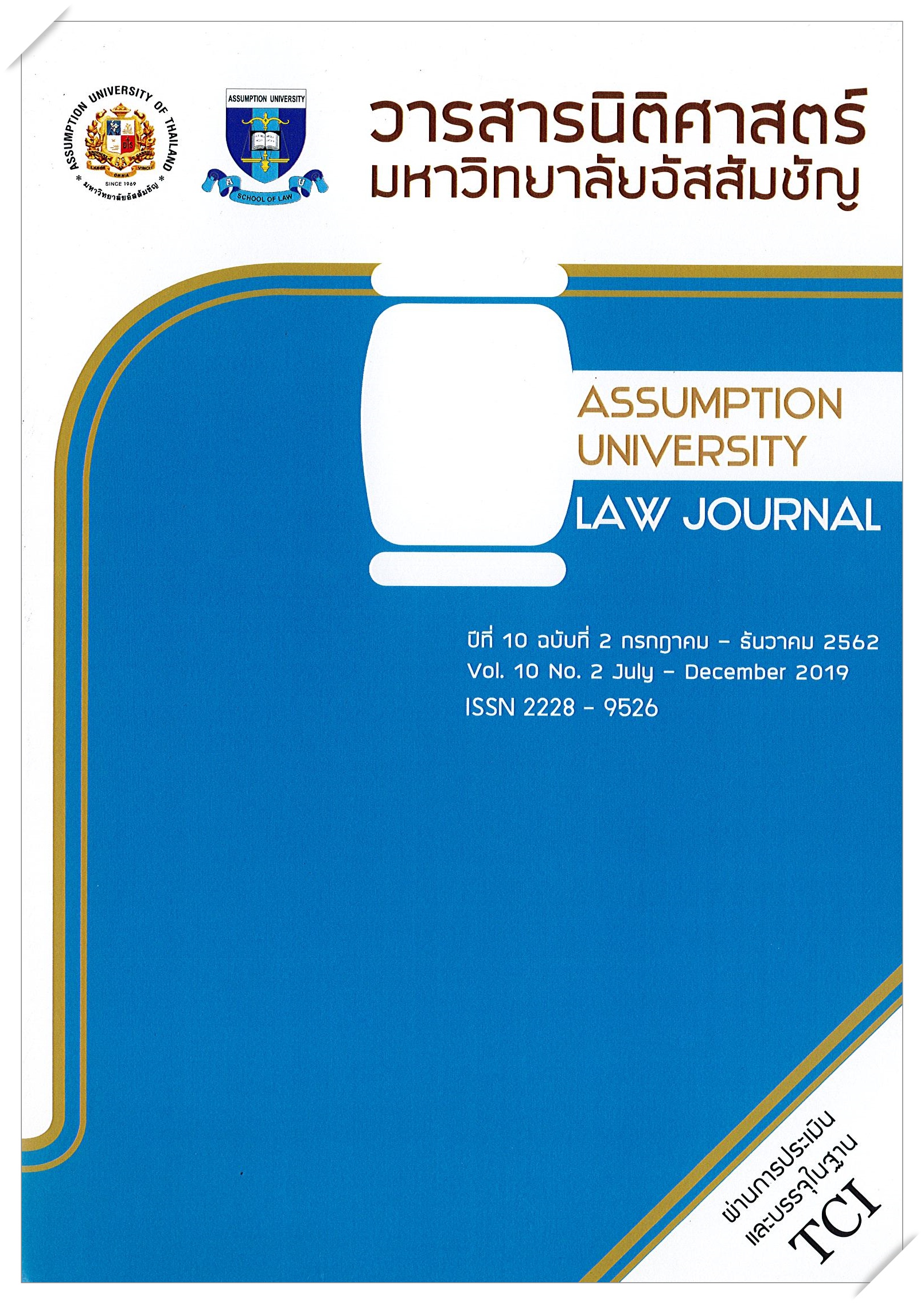การให้บริการโทรคมนาคมพื้นฐานอย่างทั่วถึงในกฎหมายโทรคมนาคม กับการพัฒนาอย่างยั่งยืนในประเทศไทย <br>Provision of Universal Service Pursuant to Telecommunications Law and Sustainable Development in Thailand
Keywords:
การให้บริการโทรคมนาคมพื้นฐานอย่างทั่วถึง, การพัฒนาอย่างยั่งยืน, นโยบายโทรคมนาคม, universal service, sustainable development, Telecommunications PolicyAbstract
บทคัดย่อ
แม้ว่าจะมีการเปิดเสรีทางการค้าบริการโทรคมนาคมให้เอกชนเข้ามามีส่วนร่วมในการให้บริการมากขึ้น แต่รัฐก็ยังจำเป็นต้องทำหน้าที่กำกับดูแลการให้บริการโทรคมนาคม เนื่องจากโทรคมนาคมเป็นโครงสร้างพื้นฐาน ที่สำคัญของทุกๆ ประเทศที่เกี่ยวข้องกับสิทธิในการสื่อสารและเข้าถึงข้อมูลข่าวสารของประชาชน อีกทั้งการให้บริการโทรคมนาคมอย่างทั่วถึงถูกกำหนดเป็นพันธกรณีหนึ่งในกฎหมายระหว่างประเทศอีกด้วย ฉะนั้น รัฐจึงมีหน้าที่ต้องจัดบริการโทรคมนาคมให้ประชาชนเข้าถึงและใช้ประโยชน์ได้อย่างทั่วถึงและเท่าเทียมกันโดยไม่มีการเลือกปฏิบัติ อันได้แก่การให้บริการโทรคมนาคมพื้นฐานอย่างทั่วถึงนั่นเอง ซึ่งประเทศไทยได้กำหนดมาตรการทางกฎหมายและนโยบายต่างๆ โดยกำหนดให้องค์กรกำกับดูแลมีหน้าที่ดำเนินการ ซึ่งระดับการครอบคลุมอย่างทั่วถึงจะมีประสิทธิภาพตามที่วางแผนไว้จะต้องมีการเชื่อมโยงกับมาตรการการดำเนินงานที่เป็นรูปธรรมเท่านั้น ดังนั้นเพื่อการพัฒนาอย่างยั่งยืนในเรื่องดังกล่าวประเทศไทยควรเล็งเห็นถึงความสำคัญของการพัฒนาเศรษฐกิจควบคู่ไปกับการพัฒนาทางด้านสังคม โดยการมุ่งใช้กลไกตลาดในการจัดสร้างความทั่วถึงโดยการสร้างแรงจูงใจให้เอกชนลงทุนในการสร้าง ความทั่วถึง ตลอดจนสนับสนุนให้มีการเพิ่มศักยภาพของอุตสาหกรรมผลิตอุปกรณ์และบริการโทรคมนาคมเพื่อ คนพิการและผู้ด้อยโอกาสในสังคม อีกทั้งภาคเอกชนเองควรเชื่อมั่นว่าการให้บริการโทรคมนาคมพื้นฐานอย่างทั่วถึงดังกล่าวมิได้เป็นภาระ ที่ไม่เป็นธรรมแต่อย่างใด
Abstract
Due to liberalization in the trade of telecommunications services, the private sector is now allowed to provide such services. However, the state still needs to supervise the provision of telecommunications services. Telecommunications services are a key part of the infrastructure of any country and are essential to the people’s right to communicate and gain access information. Moreover, international law obligates countries to provide telecommunications services to their citizens. For this reason, the state has a duty to provide unfollowed access to and use of telecommunications without discrimination. This is known as universal service. Thailand has established a legal and policy framework that requires regulators to carry out their duties. These obligations should be linked to concrete actions but this may not be achievable in a developing economy. For sustainable development, Thailand should recognize the importance of economic development along with social development by focusing on the market forces to create robust telecommunications sector. The State must encourage private investment in the provision of universal service and also support the enhancement of the telecommunication equipment manufacturing industry and the provision of services to the disabled and the underprivileged. The private sector should be confident that the provision of universal service is not unfair.
Published
Issue
Section
License
- บทความทุกเรื่องได้รับการตรวจทางวิชาการโดยผู้ทรงคุณวุฒิ (Reader) จากภายในและนอกมหาวิทยาลัย
- ความคิดเห็นใดๆ ที่ลงตีพิมพ์ในวารสารกฎหมายคณะนิติศาสตร์ มหาวิทยาลัยอัสสัมชัญ เป็นของผู้เขียน (ความคิดเห็นใดๆ ของผู้เขียน กองบรรณาธิการวารสารกฎหมายคณะนิติศาสตร์ มหาวิทยาลัยอัสสัมชัญไม่จำเป็นต้องเห็นด้วย)
- กองบรรณาธิการวารสารกฎหมายคณะนิติศาสตร์ มหาวิทยาลัยอัสสัมชัญ ไม่สงวนสิทธิในการคัดลอก แต่ให้อ้างอิงแสดงแหล่งที่มาด้วย


